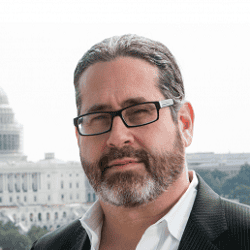
David DesRosiers
1994 Publius Fellow
What attracted you to Claremont?
Once upon a time, it was my ambition to be an academic.
While in graduate school, I would go to the American Political Science Association’s yearly meeting and The Claremont Institute—this West Coast think tank dedicated to overturning progressivism and returning the Founders’ political science to preeminent authority—provided THE safe space for heterodox thinking.
The Claremont folks didn’t think like or act like a permanent minority. They were counter revolutionaries who did not hide from public engagement. They were smart, publicly spirited, and understood the virtue of showing up.
In short, they were attractive.
How did you come to be a Publius Fellow?
My teacher Dan Mahoney—one of the greatest living students and teachers of politics—recommended that I apply, which I did serially before I was accepted.
He understood and appreciated what Claremont thought, taught, and wanted to accomplish—and he understood that it was the place that I had to pass through. And while he did not agree with Claremont on all matters—and neither do I—he was right.
What did you learn?
Claremont teaches up and coming public servants three core things:
First, that “We the People” are an experiment in self-government that was self-consciously created by a few; that we are a product of a science of politics and man that remains permanently relevant.
Secondly, that this experiment was self-consciously “deconstructed” academically by a few, before this deconstruction found political expression. What most impressed me is that these students of the Founders’ constitutionalism were equally dedicated to understanding Progressivism better than it presently understands itself.
Lastly, bringing back a contemporary return to self government requires a new bench of revolutionaries and we fellows were chosen out of many to provide it.
Claremont has an eye for human capital that they educate and plug into a network of public consequence.
What do you like most about Claremont?
Claremont knows why it exists.
They have self-knowledge—something very wanting in all times, but particularly these days. They have thought deeply about their positions and the positions of those with whom they disagree.
They are the complete opposite of the snow-flakes. They love to argue and reason vigorously and in public. This can be off-putting to their friends and fellow travelers. While I have a French surname, I have an Irish mother and Irish family values. I love a good argument. I remind those who chafe at the rough and tumble dialectics of Claremonsters, that Harry Jaffa—Claremont’s founding father—was a boxer.
Jaffa circled you, instinctively controlled the mat, had an eye for distance and weakness, and then punched and usually scored. However, Jaffa longed for a good opponent. He saw a good argument as synonymous with the pursuit of the truth. He longed for counter punchers, and he most loved fighting those with whom he mostly agreed.
I miss the old guy.
Where do you see Claremont?
Deservedly and thankfully, Claremont is at the center of things. It is where it is now because Claremont understands politics more deeply and more democratically than most. Claremont saw a potential in Trump that many, full-time movement conservatives couldn’t.
Trump was a Goldwater-style challenger to the establishment, and he won. Trump was, to paraphrase Jaffa, “immoderation in the pursuit of virtue.”
It turned out my fellow Publius classmate of 1994, Michael Anton, was this election cycle’s Harry Jaffa of Trumpism.
It started with a blog called the Journal of American Greatness—JAG—that in short order captured the conservative mind. It was sent to me from all sides to check out.
Peggy Noonan was writing about this guy Publius Decius Mus. Who was this writer, taking an ancient republican pen name, and making a prudential (rather than ideological) argument for this instinctual political amateur? I saw my old friend instantly, showing what he had learned and rising to the electoral curtain call.
Anton’s most famous contribution, “The Flight 93 Election,” came still under a pen name, but for the Claremont Review of Books website. While Michael won David Brooks’ Sidney Award for the most important article of the election, he set many neo-conservative friends on the path to becoming neo-liberals.
That said, some of his most articulate critics are fellow alumni, students, and friends of Claremont. Again, getting back to being Irish, the most fruitful contests are between those who share common ideas and do not shy away from a family dispute.
Where do you see yourself in this new and changing political landscape on the Right?
I am fair-fight promoter. RealClearPolitics is a perfect home for me. I think the pairing of rival arguments is vitally important to the health of our fledging Republic.
We show the Fourth Estate at its best, daily. What ideology and partisanship naturally try to separate and isolate, RealClear brings together.
RealClear is THE safe space for those looking to argue it out in a “real clear,” fair manner—and I can’t think of a more Claremont way to engage my particular nature at the moment.
You once wrote an open letter to your college-aged son in which you said, “Everything changed in college. I became me.” What did you mean by that, and what is the significance of college today?
A genuinely liberal and liberating education changed everything for me. It was my “Road to Damascus” moment and it changed the trajectory of my life.
I came into college thoroughly modern in every way—the good, the bad, and the ugly. At the very moment that Alan Bloom was writing about the Closing of the American Mind, mine was being kicked open by great teachers and texts. I wrote a letter to my son, Ryan, because I wanted him to understand what he had to gain if he was open to it and if he knew how to look for it.

